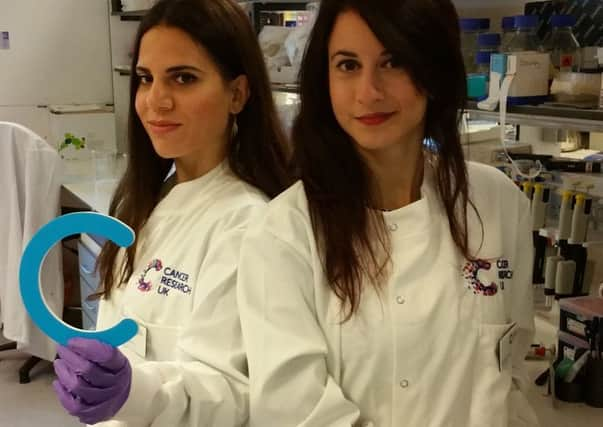Edinburgh scientists put weight behind cancer campaign


Ifigeneia Stavrou and Asimina Pantazi star in two short videos to highlight the ‘wee c’ – a partnership between leading charity Cancer Research UK and the Scottish Government.
The talented researchers, who are based at the Cancer Research UK Edinburgh Centre, are hoping to raise awareness of the on-going work taking place in Scotland to help beat cancer.
Advertisement
Hide AdAdvertisement
Hide AdStarring in one of two videos highlighting the ‘wee c’ is scientist Ifigeneia Stavrou, who is passionate about her work.
Ifigeneia relocated to the UK from her native Cyprus in 2007 and to Scotland in 2012.
Ifigeneia, whose work will hopefully find a new treatment for some forms of skin cancer, said: “I was very happy to back the ‘wee c’ because there is so much work and research going on to bring cancer down to size in Scotland.
“Cancer isn’t what it used to be and there are lots of people, like me, working every day to help turn the Big C into the wee c. We’re keen to highlight the more positive side of cancer’s story and make people realise that a cancer diagnosis doesn’t mean the end of the road, in fact, more people are surviving than ever before.
“In Scotland, Cancer Research UK invests more than £31 million a year on research projects aimed at bringing forward the day when all cancers are cured.
“This is only possible thanks to the hard work of everyone who supports us by volunteering in the charity’s shops, organising events, taking part in challenges and raising funds.”
The ‘Big C’ is still a term commonly used by the nation when referring to cancer. Research has shown that fear around what the Big C could mean is preventing Scots from taking action early if they have signs or symptoms, or are invited for screening. And, we know, the earlier cancer is found, the easier it is to treat so it’s important for people with any worries or concerns not to delay in coming forward or taking part in screening.
Another scientist based in Edinburgh who is passionate about the ‘wee c’ is Asimina Pantazi.
Advertisement
Hide AdAdvertisement
Hide AdOriginally from the Greek island Andros, Asimina has been a researcher at the Cancer Research UK Edinburgh Centre for three years.
As part of a team of scientists, Asimina’s work is aimed at finding potential new drug targets that could interfere with the building machinery that cancer cells need to grow.
Asimina said: “Half of us will be given the news of a cancer diagnosis at some point in our lives, but cancer is not what it used to be. There is less to fear now as survival is at an all-time-high.
“At the heart of that success story is research. However, there is still much to be done and we are working hard to beat cancer sooner and help even more people survive.”
The ‘wee c’ is supported by statistics which demonstrate the progress that has been made over the past 30 years, meaning that more people are surviving cancer in Scotland than ever before.
Of those diagnosed with cancer in Scotland this year, an additional 6,300 people will survive, compared to 30 years ago, thanks to approved survival rates. This equates to filling the SECC Clyde Auditorium, where the initiative was launched, twice over.
In addition, the average ten year survival rate for cancer has doubled over the past 30 years – now two in four people survive, compared to one in four in the 1970s, and today half of men and women now survive cancer (48 per cent of males, and 54 per cent of females).
However, 1,000 deaths could be avoided each year if cancer survival matched the best in Europe –more people acting early with potential cancer symptoms is key to driving down this figure.
Advertisement
Hide AdAdvertisement
Hide AdCancer Research UK’s senior public affairs manager in Scotland, Gregor McNie, said: “I want to say a huge thank you to Ifigeneia and Asimina for taking time out to highlight this important initiative.
“There is a huge amount of work going on to tackle cancer, something we hope will give people confidence to know that treatments are improving all the time.”
“If people have a worry or concern, it’s so important they visit their GP and get checked sooner rather than later. The chances are it won’t be anything serious, but if it does turn out to be cancer, finding it early could make all the difference.”